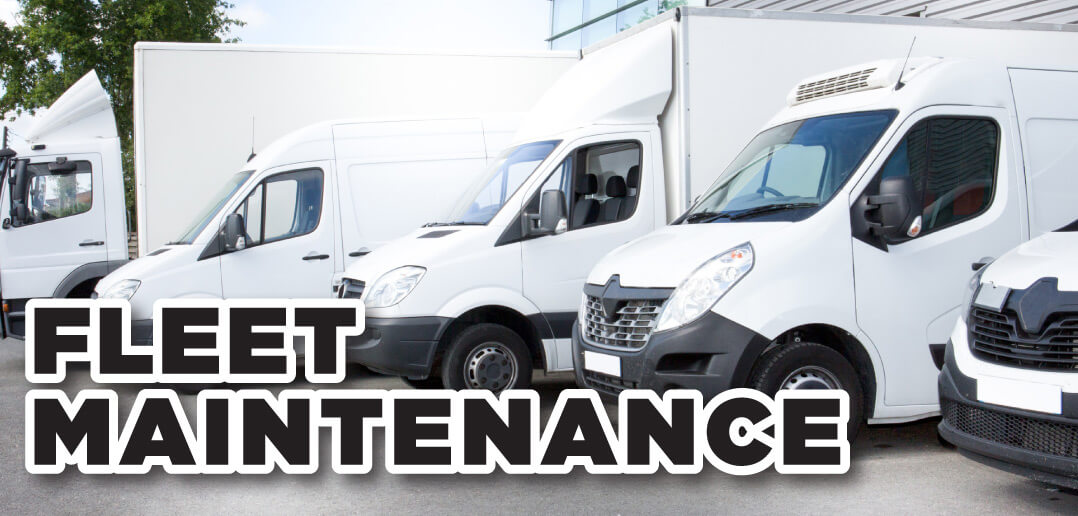Fleet Maintenance in Omaha, NE – 2018
If you have a fleet of vehicles, you likely know how important regular maintenance is to keeping you on the road while also managing costs to do so. It’s also equally important to you that your vehicles are safe for your team who are out on the road conducting business.
Some businesses have an established program with select service providers, which is recommended, while others don’t operate in this way but could certainly stand to benefit from doing so. We’ve got a breakdown of all of the important W’s – Who, What, When, Where, and Why – that should be carefully considered and applied to the maintenance program for fleets of all sizes and uses.
Who’s in Charge?
When you don’t have someone dedicated to managing your fleet program, it’s easy for things not to get done when they need to be due to everyone assuming that someone else has it handled. Depending on your operation, it could work well to have the driver of the vehicle take responsibility for having the maintenance performed. Other times, this may be a dedicated position within your business responsible for the maintenance of all working vehicles. The key is to establish a system that ensures accountability for having the maintenance performed when it is needed – rather, at the certain intervals that are recommended by the manufacturer.
Aside from who is managing your fleet vehicles, anyone who is involved in the operation or the servicing can provide helpful insight. By keeping your drivers and service professionals actively involved and listening to their feedback, you can draw a lot of helpful recommendations and ideas for best practices. With a team approach, you can ensure program effectiveness and compliance.
What’s Next and When?
Staying organized and having a checklist system for all of the necessary maintenance items will keep you in really great shape. The best part of partnering with any of the various automotive professionals for your tires, servicing, repairs, and so on is that they have excellent tracking systems they use and they’ll send out reminders when the time to have certain things done is approaching. Be sure to use that to your advantage!
Items to include in your checklist to have performed at the recommended intervals:
- Oil change (this is the most common sense of the bunch, but still, doesn’t hurt to set reminders)
- All other fluids and filters (air, fuel, radiator, transmission, and even down to the washer fluid)
- Heat and air conditioning systems
- Belts and hoses
- Exterior and interior lights
- All major systems (fuel, brakes, exhaust, etc.)
- Tires (and the wheels and rims, too)
- Engine tune-up and check mounts
- Frame and undercarriage (and regularly check for any leaks while you’re at it)
- Drive shaft and CV joints
- Airbags, safety belts, horns, windshield (all safety features should be fully functional at all times)
Where to Go?
Bottom line: you want to be working with experts at a reputable facility that will work for you and your best interests. Start shopping for a service provider or repair facility before you need one; you can make better decisions when you are not rushed or in a panic. Always try to visit the shop before making the decision on who will repair your vehicle. Look for a neat, well-organized facility with modern equipment. Look for signs of professionalism in the customer service area, which might include civic and community service awards, memberships in local and national industry organizations, Better Business Bureau recognition or signage, customer service awards, etc. Ask if the staff is technically trained and competent, and expect to see certificates and industry credentials.
If you’re looking for a service provider that specializes exclusively in fleet maintenance and repair, you’re in luck, because there is one here in Omaha – Fleetmark Solutions.
“Fleetmark Solutions is an exclusively commercial vehicle repair facility,” explains Mark Griger with Fleetmark Solutions. “We are geared towards fast turnaround time to keep commercial vehicles on the road doing what they do best, making money. We adapt to our customers because fleets are different. Commercial fleets require dedicated attention to ensure the success of their drivers and owners as well as the customers of that fleet.
At Fleetmark Solutions we know how frustrating it can be to deal with the average shop. When a vehicle needs to be dropped off for an entire day just for some maintenance it can destroy the money-making potential for that fleet. Our #1 goal is getting the vehicle in, serviced or repaired correctly, and back out into the world with as little downtime as possible. As for the most common services we perform expediently, oil changes are done in less than 30 minutes with no appointment necessary. Another example is our new BG DPF and emissions system cleaning service, which can now be completed in our shop in just 4 hours rather than the previously standard 2-3 days. Finally, since D.O.T. inspections are an essential part of conducting business for many fleets, we perform this service any time with no appointment and only charge $49.95. We function this way because we know how schedules change, and that you never really know when you may have time to take care of whatever needs to be done. Repairs are the same; bring it in and we get right on it.
We can also provide a stress-free opportunity for fleet managers and drivers by simply doing what is right. We don’t try to raise the bill by adding unnecessary services. Honesty is our policy. Finding a facility that has your best interest in mind will save hundreds or thousands every month as well as raising your income by keeping these vehicles on the road.
At Fleetmark Solutions we are constantly updating our equipment as well, so we can diagnose correctly as well as quickly. Guessing doesn’t help anyone.”
Griger also offers the following general advice on the topic of fleet maintenance: “One of the easiest ways to save some money with your fleet is to ensure a proper inspection is done about once a week. This can be done by the drivers. Check the oil and fluids, look at the tires, and the most important is to make sure they are not afraid to bring up anything that doesn’t seem right. Issues caught early are much less costly and take much less time to repair.
Unusual wear on your tires can be a sign of some steering or suspension problems that could end up costing you a fortune in tire replacements. If you notice this on your tires, bring it by and we will get it right in and diagnose the problem while you wait. Like I said before, no appointments necessary and we still get you right in. You can drop off as well. We also understand it doesn’t make sense to take two guys out of service, so he will have a ride. We give rides when necessary. After all, we work for you.
Many fleets let the oil change interval get away from them simply because of the reasons I spoke about earlier. It just costs too much to lose a unit for that long while just having a simple service performed. But, while it may save you today, you’ll pay for it later. Oil is VERY important for the life and performance of the engine. I believe it’s well worth 30 minutes to protect your investment.
Please feel free to give me a call and ask any questions you have about what we can do for your fleet. Whether its hundreds of vehicles or just the one you drive, Fleetmark Solutions will take care of you like family.”
Why Preventive Maintenance?
As was previously mentioned, being proactive and keeping your vehicles well cared will ensure you get the most out of your investment in each vehicle. It will keep your people working by avoiding any downtime when a vehicle is temporarily out of commission as well as any scheduling nightmares that would happen as a result of a breakdown. By keeping a vehicle running at peak performance, you’re also way less likely to be incurring any unexpected repair costs and you’ll get optimal mileage.
Now, that’s not to say that there won’t be accidents or breakdowns that happen along the way, despite being on top of things and having all of the recommended services performed. When this happens, again as previously mentioned, you want to know exactly who to call and where to take it. Particularly when it comes to accident repair, remember that you, the vehicle owner or fleet manager, have the right to choose who will be working on your vehicles – not your insurance company. While they will certainly make recommendations, those are just that – recommendations, not obligations. Since any amount of downtime can negatively impact your business operations, you’ll want to work with someone who can get the job done for you up to industry standards in a time-efficient manner (but while not sacrificing quality) in order to minimize lost revenue. From glass repair and replacement to paintless dent repair and collision/framework repair, having any type of repair done right away and not letting it fall to the wayside is just as important as preventive maintenance. Especially when the vehicle is still operable, it can be easy to say you’ll take care of it soon – and then time goes by and you haven’t gotten to it yet. In the meantime, there could be further damage/deterioration that could end up being more costly to fix, or safety issues that could compromise your business.
Sure, it’s just vehicle maintenance – but in both the short and long run, it’s major and should be considered a priority. It’s important to have fleet maintenance plan in place if you want to keep your wheels (and employees) on the road and not in the shop. Most vehicles have a recommended maintenance plan provided from the vehicle manufacturer, as well as from the parts and tire manufacturers in terms of servicing and replacement. Generally this will include specific checks and maintenance to be performed at certain mileage intervals. If you haven’t followed the factory plan it’s not too late to start, and a local service center like the ones you see displayed on these pages can help get you back on track.


